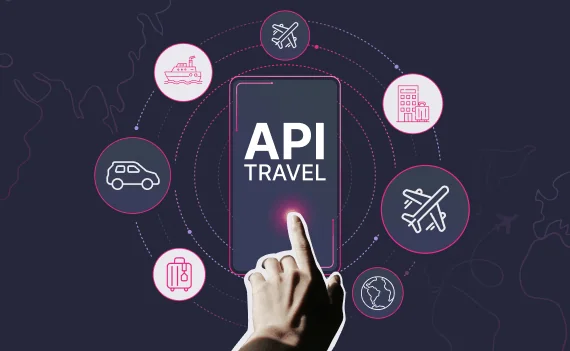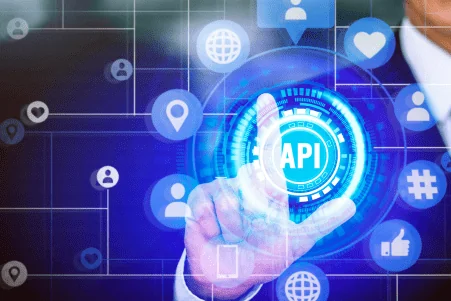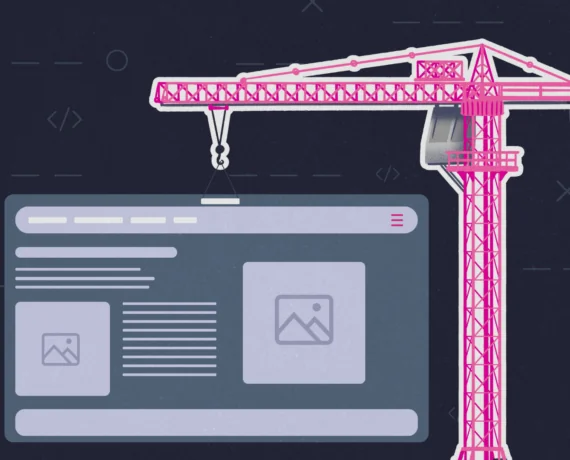Table of Content
- Introduction to Property Management
- What is API in property management?
- Example of Property Management APIs:
- Third parties connecting to your PMS through API
- Common Challenges in Property Management
- Myths about Property Management System Integrations
- PMS integration tips
- Future of Property Management
- Conclusion
What to integrate your PMS with API?
Book a callIntroduction to Property Management
Property management is a crucial aspect of content delivery networks (CDNs), and Akamai’s Property Manager is a powerful tool for managing and configuring properties. The Akamai Property Manager API (PAPI) is a RESTful API that allows developers to interact with Property Manager and manage properties programmatically. With PAPI, developers can create, update, and manage property configurations, including edge hostnames, origin servers, and custom behaviors. The Property Manager application provides a user-friendly interface for managing properties, and the API client allows for automation and integration with other tools.
What is API in property management?
Unlike feature development, which allows you to customize it as you need and want, an application programming interface (API) is a hard and fast protocol, tools, and definitions that permit specific software application programs to communicate and share information. APIs allow software program management structures to connect with special programs, including accounting software program programs, protection control systems, customer relationship management (CRM) structures, and more.
APIs in assets management can facilitate various talents, which consist of:
- Integration with accounting software program: APIs permit assets control software programs to sync financial facts with accounting systems like QuickBooks or Xero, streamlining accounting processes.
- Maintenance Management: Property management software API can integrate with maintenance control equipment, keeping in mind green tracking of work orders, scheduling upkeep responsibilities, and tracking belongings protection.
- Member portals: APIs can allow the aggregation of tenant portals with belongings manipulate software, supplying tenants with online right of entry to rent agreements, rental fee processing, upkeep requests, and communique with belongings managers.
- Listing Syndication: Property control software can use APIs to syndicate property listings at some stage in numerous online systems, including real estate internet sites and apartment marketplaces, ensuring maximum visibility for to-be-had properties.
- Reporting and analytics: APIs can facilitate the mixing of belongings administration software program applications with reporting and analytics systems, enabling belonging managers to generate complete reviews of financial performance, occupancy expenses, upkeep trends, and more.
- Configuration and Management: APIs can be used to configure property settings, manage rules for processing end-user requests, and declare user variables in configuration files. This ensures that various templates and settings can be effectively utilized across different environments.
Example of Property Management APIs:
While the specific APIs will vary depending on your chosen software, here’s an example of their functionality: Akamai Property Manager API. This API provides functionality for managing property configurations, hostname activations, and retrieving property versions. It allows for managing property versions by retrieving, updating, and promoting them, ensuring changes are synchronized across environments. Ensuring the JSON file is correct and complete before deployment is crucial, as the validation process will return a list of errors and warnings. Handling these errors is essential for the successful activation of properties.
APIs are vital in improving the functionality and overall performance of belonging control software programs, enabling tight property management system integration with software program systems.
Discover best practices for third-party API integration for optimizing your development process.
Travel and Booking APIs: Сonnectivity Landscape
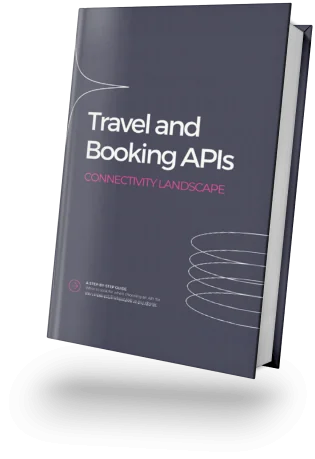

Third parties connecting to your PMS through API
In recent years, technological advances have changed the way businesses are run. Instead of being limited to one gadget, property managers have started to use different software programs for specific parts of their business operations, thanks to API property management. With the rise of systems like Airbnb in 2008, the industry noticed a rise in software program solutions that addressed vacation rental management wishes. Initially, property managers transitioned from spreadsheets to purpose-built property management structures (PMS) like First Resort Software (FRS).
Looking for a tech partner for your startup?
Managing multiple accounts within these systems can be streamlined using features like the account switch key. This allows property managers to switch between accounts seamlessly, ensuring that commands affect the correct account without constant re-authentication. Specifying the account ID in commands is crucial for accurate API interactions and efficient management of configurations across different accounts.
Let’s take a look at some integrations that have become important for smooth operations:
-
Revenue Management Systems (RMS):
Gain data-driven insights to optimize pricing strategies and maximize profitability.
-
Customer Relationship Management (CRM):
Improve the guest experience by centralizing guest data and personalizing interactions.
-
Guest Communication:
Automating guest communication streamlines operations saves time, and improves the guest experience. Solutions such as GuestGuides.Com combine with PMS to provide customized pre-arrival communication.
-
Guest Management / Experience:
Improving the guest experience is critical for property managers. Integrating technology solutions such as YourWelcome Smart Tablet enables personalized visitor reports, improving satisfaction and loyalty.
-
Cleaning & Maintenance Software:
Property maintenance software such as PropertyCare.Com transforms cleaning and security operations. PMS ensures green scheduling and task manipulation to meet increased health requirements.
-
Smart Locks:
Non-contact entry, made easier by smart locks, has grown to become common in the business world. Integration with PMS allows for automated entry to control, enhancing protection and guest comfort.
An API-integrated PMS connects seamlessly with OTAs, payment processors, and smart lock systems, giving property managers full control in real time.
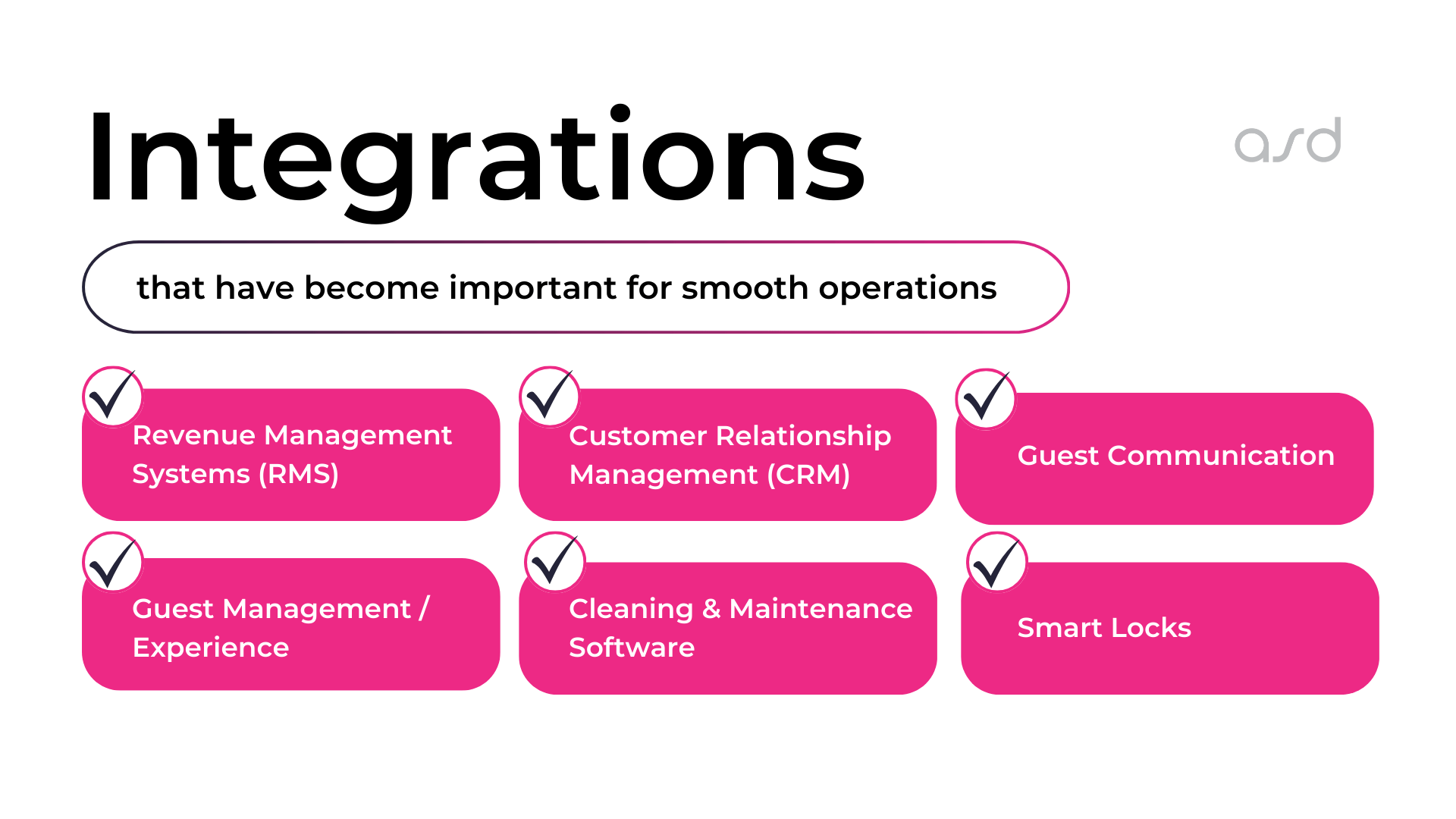
Common Challenges in Property Management
One common challenge in property management is managing multiple properties and configurations. The Akamai Property Manager API provides a solution to this challenge by allowing developers to manage multiple properties and configurations using a single API. Another challenge is ensuring that properties are properly configured and secured. The Property Manager API provides a range of security features, including authentication and authorization, to ensure that properties are secure and access is controlled. Additionally, the API provides features such as error handling and logging to help developers troubleshoot and debug issues.
Myths about Property Management System Integrations
Common myths about cost concerns, provider hesitation, data security, and scalability limitations often prevent organizations from fully adopting integration solutions. However, a closer look shows that these myths are false. Today’s API technologies offer fast property management system project documentation solutions that ensure the safe transmission of sensitive data between systems. Let’s take a closer look at more of them!
-
Myth #1: Cloud PMS is just too expensive!
Using a cloud PMS is now less expensive for any company. Forget about the hardware, storage, power, and security issues of traditional systems. The benefits of Cloud PMS come in the long run. Simply store your data and watch your costs drop without the need for infrastructure.
-
Myth #2: PMS companies don’t collaborate.
This could not be farther from the truth. PMS is vital to the hotel industry, and integration is key. New cloud systems are designed with today’s APIs for easy integration.
-
Myth #3: Legacy PMS works just fine.
While it may seem that way, legacy structures consist of numerous problems. Everything advances, including PMS. Outdated structures can avoid integration, cause protection risks, and lead to overall performance loss, so, it’s time to upgrade!
-
Myth #4: Virtual data is lost or hacked.
Modern protection features protect digital information. Physical server damage is also no longer likely, due to over-protective facilities. Enhanced TLS is crucial for secure communications, ensuring data is safely transmitted. Proper DNS configuration with a CNAME record is essential for redirecting traffic to edge hostnames securely. Additionally, configuring origin behavior optimally within the Property Manager setup enhances site performance and delivery.
-
Myth #5: Cloud PMS integration is most effective for small organizations.
Incorrect! Cloud PMS allows for quick growth, minimizing barriers and resource spending. It provides scalable benefits without the problem of physical storage.
Let’s talk about your project? Feel free to ask any additional questions you might have. Our experts will be glad to assist you.

PMS integration tips
Managing the complexities of property management system integration requires careful planning and strategic execution. To maximize the impact and efficiency, businesses should consider several key factors. Here are some of them:
- Identify your needs: Carefully analyze your specific needs to identify the most useful integrations.
- Evaluate compatibility: Make sure the software you choose integrates seamlessly with your existing PMS to avoid any compatibility issues.
- Prioritize security: Select solutions with strong security features to protect guest data.
- Seek Expert Guidance: Consult with experienced professionals to navigate the integration process and maximize results. In case, you have any questions and looking for professional guidance, contact us to develop your travel software project, as we have over 15 years of experience and 100+ successful cases. Consult with experienced professionals to navigate the integration process and maximize results. In case, you have any questions and looking for professional guidance, contact us to develop your project, as we have over 15 years of experience and 100+ successful cases.
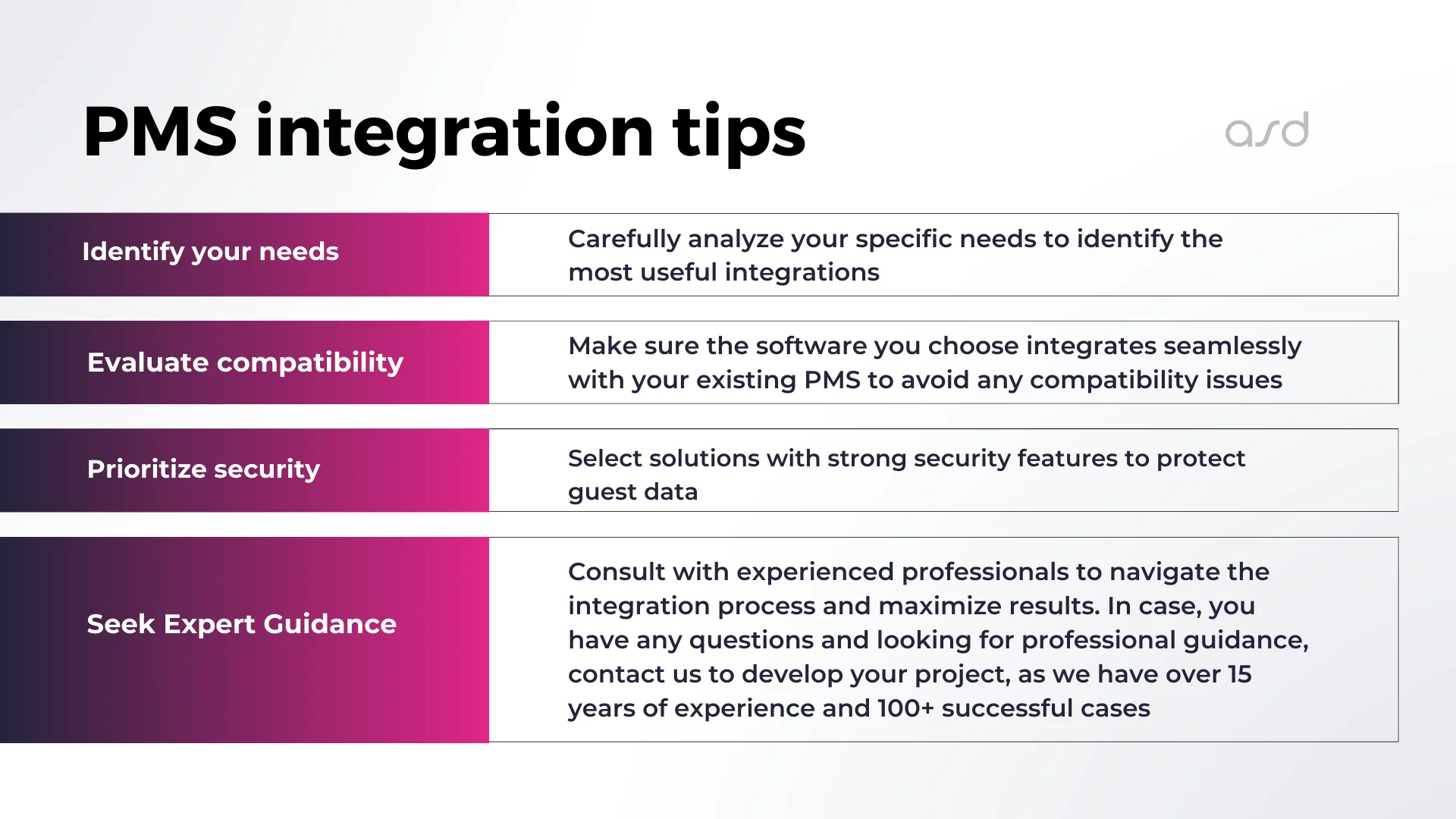
Future of Property Management
The future of property management is likely to involve increased automation and integration with other tools and platforms. The Akamai Property Manager API is well-positioned to support this trend, with its robust and flexible architecture. As the number of properties and configurations continues to grow, the need for efficient and automated management tools will become increasingly important. The Property Manager API will play a key role in supporting this growth, enabling developers to manage properties and configurations at scale. With the rise of edge computing and the increasing importance of edge hostnames, the Property Manager API will also play a critical role in managing and configuring edge hostnames and origin servers.
Conclusion
Property management system (PMS) integration is no longer an afterthought, but a critical component for hotels looking to succeed in the virtual world. By using APIs to connect your PMS to a strong environment of devices, you unlock a wealth of benefits. Optimized operations translate into multiplied performance, allowing employees to focus more time on guest interactions and personalized service.
Real-time data from integrated structures empowers informed decision-making, optimizing pricing techniques, maximizing sales opportunities, and searching for guest goals.
Finally, seamless PMS API integration promotes a smooth user experience, from online booking to customized web page interactions. Companies that adopt integration may be well-positioned to survive and shine in a competitive marketplace. Remember, integration isn’t a single factor, however an ongoing path of discovery. Stay informed about the current generation, look at your wants, and adapt your integrations to stay ahead of the market. By taking advantage of the energy of PMS integration, you will see the full potential of your business and transform it right into a haven for satisfied and trusted clients.
A payment processing API helps property managers handle transactions securely and efficiently. It automates rent collection, sends reminders, and tracks payment history, streamlining financial operations across multiple properties.
API stands for Application Programming Interface. In property management, it acts as a bridge for the exchange of facts between your PMS and various software program systems. This allows for seamless communication and integration among the many devices and systems used in property control operations. You can create a new version of a property or rule tree later, enabling custom adjustments while retaining previous versions. Managing changes within production networks, such as Akamai’s staging and production networks, is crucial for deployment purposes. The Akamai network plays a significant role in content delivery, ensuring efficient workflow management and seamless integration.
A wide range of programs can be integrated into your PMS through the API, together with booking net websites, income control structures, channel control systems, CRM systems, upselling software program software, and enterprise intelligence tools. By using API property management, business owners can optimize their operations, improve performance, and enhance the overall visitor experience. These integrations allow up-to-the-minute record synchronization, computer-driven strategies, and better choice-making skills, ultimately leading to company growth and profitability.
Questions? Answers!
What makes a good property management system (PMS)?
A good PMS streamlines operations with features like lease tracking, automated rent collection, maintenance management, and financial reporting. It should be scalable, secure, and efficiently integrated with other systems.
How do I prioritize features for my property management system?
Prioritize features based on your business needs. Start with essential functions like lease tracking and rent collection, then add maintenance management and financial reporting as you grow. Ensure the system is scalable and user-friendly for future demands.
What are the benefits of a custom-built property management system?
A custom-built PMS is tailored to your specific business needs, offering better scalability, flexibility, and efficiency. It ensures you have a system designed to handle unique challenges and growth, unlike off-the-shelf solutions that may have limitations.
Should I optimize my current property management system or start from scratch?
If your current PMS could be more efficient and scalable, rebuilding may offer better long-term benefits. Optimizing might be quicker and cheaper, but it could limit future growth.
How can I improve the user experience with my property management system?
Improving UX involves making the system intuitive, easy to navigate, and responsive. Regular updates, simplifying workflows, and improving customer support enhance user experience.

